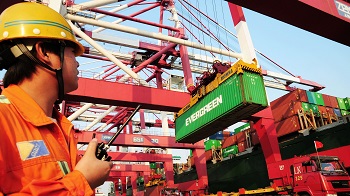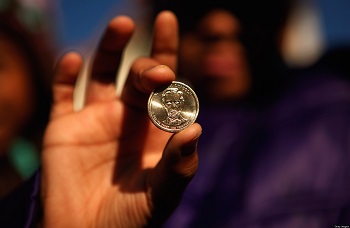Monthly Economy Report
By Andrew Smith
 The Chinese economy has had a pretty rocky month, to say the very least. After the annual Boao Forum conference there was an initial wave of positive sentiment amongst analysts who liked the sound of the Chinese leadership's vision for the future. But it didn't take long for fears of a hard landing to rise back up to the surface. Both the export and import figures for March painted a very gloomy picture indeed. According to the most recent trade data from the country's Office of National Statistics, exports fell by almost 15 percent from the previous year. Imports fell by 12.3 percent, surpassing analysts' predictions of an 11 percent contraction.
The Chinese economy has had a pretty rocky month, to say the very least. After the annual Boao Forum conference there was an initial wave of positive sentiment amongst analysts who liked the sound of the Chinese leadership's vision for the future. But it didn't take long for fears of a hard landing to rise back up to the surface. Both the export and import figures for March painted a very gloomy picture indeed. According to the most recent trade data from the country's Office of National Statistics, exports fell by almost 15 percent from the previous year. Imports fell by 12.3 percent, surpassing analysts' predictions of an 11 percent contraction.
It is no exaggeration to say that commentators in and outside of the Middle Kingdom are starting to get very jittery about the ongoing slowdown. Michael Hewson of CMC Markets has pointed out that this reduction in Chinese growth could "ripple out across the globe". He went on to say that "These data misses raise concerns that not only is the Chinese economy failing to rebalance with demand remaining low, but also the global economy's demand for Chinese exports is also falling back raising concerns about the state of the global recovery as well".
As shocking as these figures were at the time of their release it is pretty clear what the major factors are. The Eurozone, with its lack of growth and potentially catastrophic credit situation, is providing a major drag on global growth that doesn't seem likely to ease any time soon. Other parts of the developed world are recovering but they too are still on shaky ground, with an interest rate hike in the Unites States and the United Kingdom remaining a likely outcome by the end of the year. China is of course feeling the fall out of all of this to a much greater extent than anyone would have ever imagined when the financial crisis first set in seven years ago.
The time of year is obviously another key factor. According to Asia economist at Capital Economics, Mark Williams, "Part of the explanation may lie in the fact that the Chinese New Year break fell unusually late in February this year. Some exporters may still have not been running at full speed early in March". Traditionally the Spring Festival period, in which millions of people put down their tools and head back to their home towns to spend time with their families, slows down economic growth in the first quarter of any given year. The period after the actual holiday is also a major headache for factories as some of their workers will simply decide not to return to work or find another position elsewhere.
 Then there is the old conundrum of currency fluctuations. Over the last few months the dollar has surged against other major currencies as speculators became increasingly risk averse with regards to European and emerging markets. In order to stay within the People's Bank of China's official fluctuation band the Yuan has followed suit and is now close to historic highs against the pound sterling and a number of other currencies. Not surprisingly this has had a significant impact on the price competitiveness of China's all-important manufacturing sector. The startling thing though is that the import data hasn't reflected this increase in buying power to any great extent. It seems like Chinese consumers are also being cautious and maintaining a relatively prudent lifestyle. There is also the fact that commodity imports have been slowing for some time as less money is being thrown at infrastructure projects and the like.
Then there is the old conundrum of currency fluctuations. Over the last few months the dollar has surged against other major currencies as speculators became increasingly risk averse with regards to European and emerging markets. In order to stay within the People's Bank of China's official fluctuation band the Yuan has followed suit and is now close to historic highs against the pound sterling and a number of other currencies. Not surprisingly this has had a significant impact on the price competitiveness of China's all-important manufacturing sector. The startling thing though is that the import data hasn't reflected this increase in buying power to any great extent. It seems like Chinese consumers are also being cautious and maintaining a relatively prudent lifestyle. There is also the fact that commodity imports have been slowing for some time as less money is being thrown at infrastructure projects and the like.
On a brighter note, inflation remained very low for the first quarter of the year. The figures for March showed that it had remained unchanged at around 1.4 percent. This will please central bankers, whose job it is to keep price increases steady, and investors and the government who have feared for some time that China will enter a similar deflationary cycle to the one that is happening in other parts of the world. That would of course be good for consumers but it would be a disastrous outcome for local governments given that the high levels of public debt would become even more difficult to sustain. For the time being though it seems reasonable to assume that prices will remain fairly stable. The key question is whether the PBoC will be willing to step in and make sure they do by reducing the reserve requirement ratio (RRR). They already made a move on this back in February, cutting the ratio by 50 basis points to 19.5 percent of total holdings.
 Paradoxically these weak trade figures and ultra-low rates of inflation are happening at a time when Chinese stocks are at a seven-year high. Even more astonishingly, shares in financial giant China Construction Bank, which has a large stake in the country's turbulent property market, have shot up by 20 percent in the last month. This makes its current valuation higher than JP Morgan and Facebook. The huge rally in the wider Chinese stock market suggests that investors are not overly concerned about China's future prospects just yet. Many of them are perhaps betting on a big fiscal stimulus move from the Chinese government over the next few months in order to give the economy a boost and help to make their official growth target of 7 percent a reality.
Paradoxically these weak trade figures and ultra-low rates of inflation are happening at a time when Chinese stocks are at a seven-year high. Even more astonishingly, shares in financial giant China Construction Bank, which has a large stake in the country's turbulent property market, have shot up by 20 percent in the last month. This makes its current valuation higher than JP Morgan and Facebook. The huge rally in the wider Chinese stock market suggests that investors are not overly concerned about China's future prospects just yet. Many of them are perhaps betting on a big fiscal stimulus move from the Chinese government over the next few months in order to give the economy a boost and help to make their official growth target of 7 percent a reality.
Another big round of fiscal stimulus packages may please investors in the short term but it certainly isn't going to fix anything in the long run; in fact it will make a deteriorating credit situation even worse. The key to solving China's growing pains lies more in structural reform than in public spending. As former U.S. Secretary of the Treasury Henry Paulson recently wrote in The Wall Street Journal, "If, as Beijing has promised, the slowdown is accompanied by deep and serious structural reform that opens up new growth opportunities, such as allowing the private sector to compete against state monopolies in service sectors like banking and telecommunications, then China will still grow robustly compared with all other major economies".
---END---